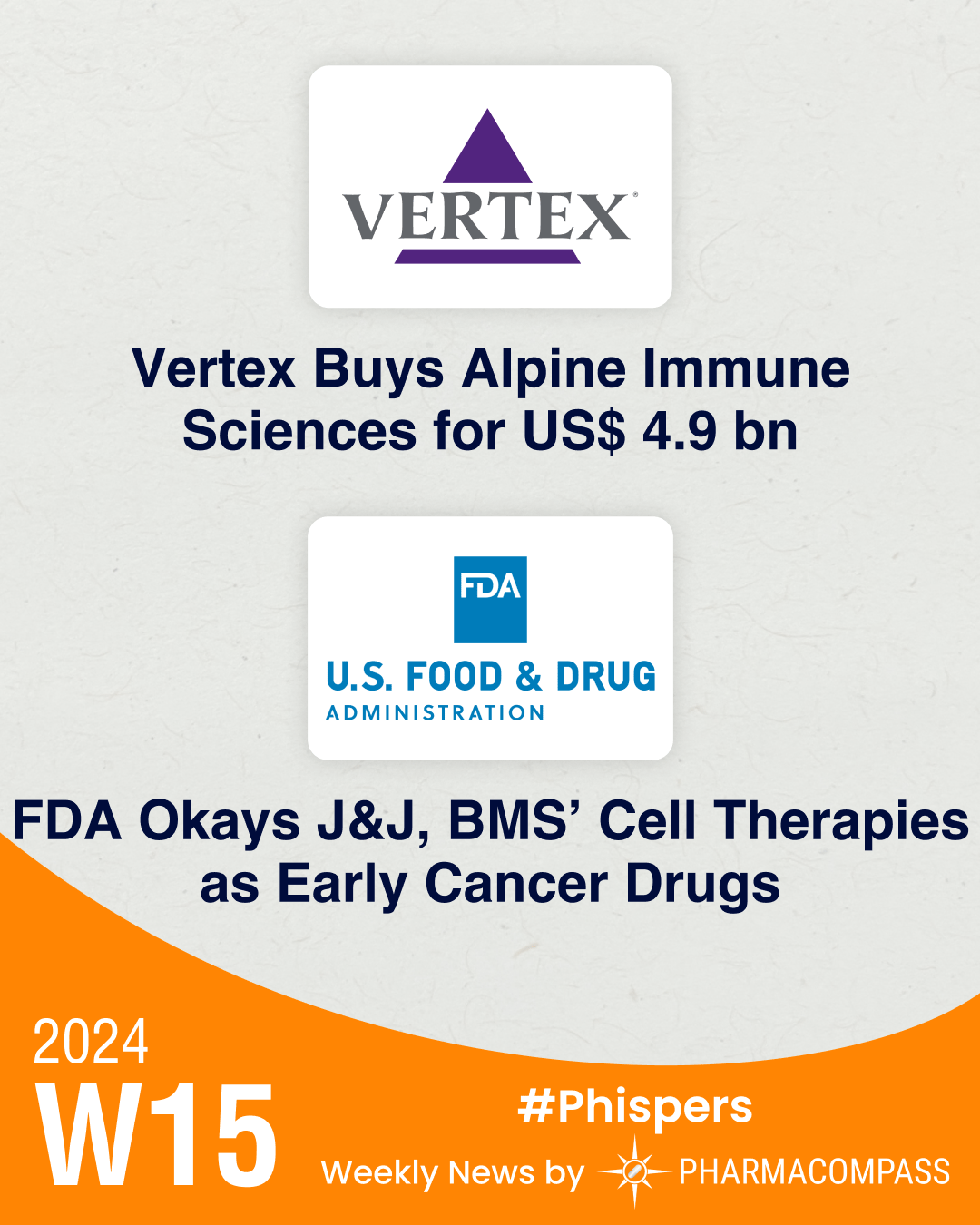
By PharmaCompass
2024-04-11
Impressions: 1,875 Article || 4 Video
This week’s Phispers comes packed with deals, approvals and trial wins. Vertex Pharmaceuticals has decided to bet big on immunotherapies by buying Alpine Immune Sciences for around US$ 4.9 billion in cash. Merck KGaA has entered into a multi-year partnership with Caris Life Sciences, a next-generation AI TechBio company and precision medicine pioneer, to develop novel antibody drug conjugates (ADCs). In devices business, Johnson & Johnson MedTech has picked up Shockwave Medical for around US$ 13.1 billion.
In approvals, the US Food and Drug Administration (FDA) has allowed Johnson & Johnson-Legend’s Carvykti, and Bristol-Myers Squibb-2seventy bio’s Abecma as earlier lines of treatment for blood cancer. FDA has granted AstraZeneca and Daiichi’s oncology med Enhertu a broad (accelerated) approval to treat various cancers that are stimulated by a certain protein.
In trials, BMS’ schizophrenia drug KarXT and AstraZeneca’s Imfinzi saw late-stage wins.
In regulatory news, India’s Kilitch Healthcare was hit with a scathing warning letter from FDA over alarming conditions at its facility in Mumbai. And Jubilant Generics was issued a Form 483 by the agency.
Vertex bolsters its pipeline for autoimmune diseases with US$ 4.9 bn Alpine buy
Vertex Pharmaceuticals is acquiring Alpine Immune Sciences for US$ 4.9 billion. The deal gives Vertex access to Alpine’s protein-based immunotherapies for autoimmune diseases. Through the acquisition, Vertex gains a promising drug known as povetacicept, which is in mid-stage development to treat IgA nephropathy (IgAN), a serious kidney disease.
Merck KGaA inks ADC deal with Caris: Merck KGaA has entered into a multi-year partnership with Texas-based Caris Life Sciences for the discovery and development of first-in-class ADCs for cancer patients. The German drugmaker will provide Caris’ therapeutic research arm an undisclosed upfront payment. Caris will also be eligible to receive milestone payments of up to US$ 1.4 billion along with tiered royalties. Meanwhile the US’ Merck (MSD outside US) also snapped up a biotech startup — Abceutics — that was spun out of the laboratory of the University at Buffalo for about US$ 208 million. Abceutics’ payload-binding selectivity enhancer (PBSE) technology is meant to boost the safety of ADCs.
J&J buys Shockwave Medical for US$ 13.1 bn: J&J has agreed to buy Shockwave Medical for about US$ 13.1 billion. The move boosts its cardiac-health-centric medical devices business. Shockwave Medical makes devices that rely on shockwaves to break down calcified plaque within heart vessels, mirroring the methodology used in treating kidney stones.
FDA approves Carvykti, Abecma as earlier lines of blood cancer treatment
J&J and Legend’s Carvykti has become the first and only BCMA-targeted therapy approved by FDA for patients with relapsed or refractory multiple myeloma, who have received just one prior line of treatment. In 2022, the CAR-T therapy was approved by the US agency as a fifth-line option for multiple myeloma patients and now it has become a second-line option. The approval is an important milestone in J&J’s plans to make Carvykti (ciltacabtagene autoleucel) a US$ 5 billion-plus asset at peak yearly sales. It brought in US$ 500 million last year and following the label expansion, analysts predict US$ 950 million in sales this year and as much as US$ 7.6 billion in global peak sales.
FDA also greenlit BMS and 2seventy bio’s Abecma (idecabtagene vicleucel) for triple-class exposed relapsed or refractory multiple myeloma after two prior lines of therapy. Both therapies significantly reduced the risk of disease progression or death in their respective phase 3 trials – Carvykti by 59 percent and Abecma by 51 percent.
Astra-Daiichi’s Enhertu wins broad approval: AstraZeneca and Daiichi Sankyo’s Enhertu (trastuzumab deruxtecan) has been granted accelerated approval in the US to treat adult patients with HER2-positive solid tumors that have spread or cannot be surgically removed. These patients have undergone prior treatment and have no satisfactory alternative options available. Now, with this broad approval, Enhertu has become the first ADC okayed to treat such tumors anywhere in the body.
BMS’ schizophrenia drug reduces symptoms without weight gain in phase 3 trial
Late-stage interim results have shown that BMS’ schizophrenia drug KarXT (xanomeline-trospium) continued to improve symptoms of the severe mental disease at 52 weeks. More significantly, this was achieved without weight gain, a common side effect associated with other antipsychotics. In fact, most patients (65 percent) experienced reductions in weight over the course of the trial with a mean weight decrease of 2.6 kilograms observed at one year. KarXT was the lead candidate in the New Jersey drugmaker’s US$ 14 billion buyout of Karuna Therapeutics. FDA has given it a Prescription Drug User Fee Act (PDUFA) date of September 26.
Diabetes drug may slow impact of Parkinson’s disease: Patients with Parkinson’s disease who took Sanofi’s diabetes med lixisenatide did not see worsening of motor symptoms after one-year of clinical trial, a paper published in the New England Journal of Medicine said. This development was hailed as a vital advance in the decades-long quest for a drug to slow the impact of Parkinson’s disease.
AstraZeneca’s Imfinzi improves survival in phase 3 lung cancer trial: Imfinzi (durvalumab) significantly improved overall survival and progression-free survival for patients with limited-stage small cell lung cancer in a phase 3 trial. This makes the blockbuster drug the first and only immunotherapy to demonstrate survival benefit for this aggressive form of lung cancer in a late-stage trial. Imfinzi had clocked sales of US$ 4.24 billion in 2023.
FDA issues warning letter to India’s Kilitch; Jubilant hit with Form 483
India’s Kilitch Healthcare was hit with a scathing warning letter from the FDA over alarming conditions at its facility in Mumbai. It was found that staff worked barefoot in sterile rooms, operated machinery without goggles, leaned over opened and filled eye drop bottles and failed to disinfect components that touched the facility walls. FDA found the facility in “disrepair” with peeling paint, stains, and residues. In November last year, Kilitch had recalled 27 eye drops in the US market due to safety concerns.
Jubilant slammed with Form 483: India’s Jubilant Generics was issued a Form 483 following an FDA inspection of its Bhagwanpur (Uttarakhand, India) facility between January 25 and February 2. During cleaning checks, FDA found evidence that some medicines may not have met quality standards (out-of-specification drugs). Jubilant Generics failed to identify a root cause of why these drugs failed quality standards. The company also could not take appropriate corrective and preventative actions. Furthermore, it distributed the affected lots in the US market.
The PharmaCompass Newsletter – Sign Up, Stay Ahead
Feedback, help us to improve. Click here
Image Credit : Phisper Infographic by PharmaCompass license under CC BY 2.0
“ The article is based on the information available in public and which the author believes to be true. The author is not disseminating any information, which the author believes or knows, is confidential or in conflict with the privacy of any person. The views expressed or information supplied through this article is mere opinion and observation of the author. The author does not intend to defame, insult or, cause loss or damage to anyone, in any manner, through this article.”






